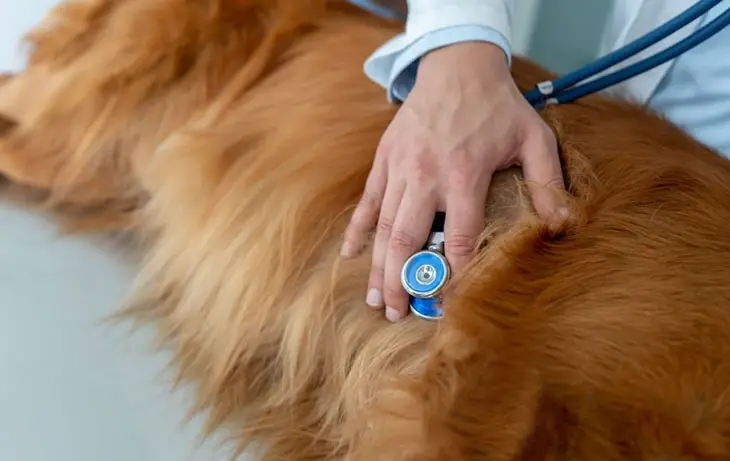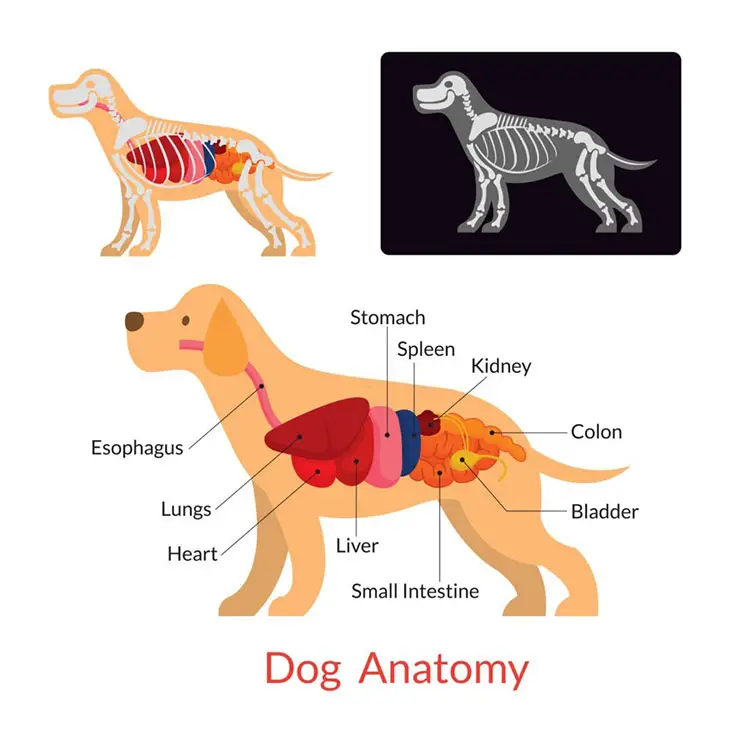The term “soulmate” often prompts us to think of a best friend, an amazing partner, or anyone we can confide in. But can animals like dogs be your besties?
Concepts of heart dogs have existed for years, serving as a source of contentment and stress relief for their human owners.
In this article, you will find your long-awaited answers to the burning question, What is a heart dog? – along with other relevant tips.
What Is A Heart Dog?

Whats a heart dog?
“Heart dogs” point to a special animal companion that shares a deepening relationship with their human owner, which goes far beyond the usual owner-pet bond.
Let’s dig deep into the details.
What Is Heart Dog Meaning?
What does it mean to have a soul dog? It means these canines connect with humans on a deeper, more emotional level, understanding them in ways other animals or dogs will never do.
Such a strong bond is sometimes described as unwavering loyalty, unconditional affection, and other similarly powerful terms.
And that is to be expected; dogs are the most loyal animals I have ever known, possessing a keen sensitivity that allows them to detect what or when their humans need support or comfort.
A heart dog may come in every breed, size, and shape. It is not necessarily a working dog or a trained service canine; even purebreds or rescued animals can become someone’s heart dogs.
And no set personalities are defined for them, either; my dog is energetic and boisterous, while my friend’s leans more into the quiet side.
It does not matter; our unique connections with them are more important than all else, and that’s something outsiders are not supposed to decode or understand.
For some owners, these dogs are not just mere pets or friends; on my part, I have long viewed my heart dog as a cherished family member.
We have been together for more than 20 years, and this relationship will likely last for the rest of my life.
Is A Heart Dog The Same As A Human Soulmate?
No. While a human soulmate and a heart dog provide you with great emotional reliance and strength, the two relationships are different in nature.
With heart dogs, the bond encompasses mental support and unconditional loyalty, emphasizing the joy and companionship a dog can bring about to humans – rather than vice versa.
Sure, it is powerful and life-changing, but I cannot deny that it is far different from human relationships.
Meanwhile, human soulmates share a profound common ground with each other. Joys and emotions aside, they often have similar interests, life goals, and background experiences.
By illustration, as you and your soulmates go through the same troubling events in our lives, you two understand each other even more than our own family.
As a result, relationships with human soulmates are far more multifaceted and complex than with heart dogs, involving more shared values and intellectual stimulation.
But do these differences really matter that much? After all, both types of bond play a critical, irreplaceable role in our life.
What If Your Heart Dog Passes Away? Ways to Heal Yourself

Take Your Time to Mourn and Grieve
The dog might have been an irreplaceable part of your life for too long, so mourning will inevitably take some time. Just accept it; nobody should dictate to you when to “get over that.” or “move on.”
After all, grief often arrives in waves. Even after you start feeling better, the loss and sadness might be triggered once more by:
- Hearing someone else lose their pets
- A name that resembles that of your dog
- Special days (ex: its birthdays)
Hence, setting a schedule or timetable for your grief is impossible; it cannot be hurried along or forced.
Do Not Ignore or Hide Sadness
Face it head-on. Trying to conceal or put it aside in the darkest corners of your mind – instead of showing it openly – only delays both your grieving process and the healing that should follow.
Pound the pillow, pour your heart out with someone, scream, or cry. Do anything you can to lift those heavy stones off your shoulders.
Seek Support From The Right Place
Who do you often turn to whenever you feel hurt? Close family, relatives, and best friends are often the most common answers.
Still, do not be thrown off if they tell you, “It’s just a dog! Cheer up!” or “No worries; I can always get you another one.”
Although they care for you, most of these people do not truly understand the canine relationships you share with your dog.
They will be more likely to show sympathy if it’s your human friend or family member that passed away; for the lives of animals, not so much.
Without somebody to cry on, your misery might worsen over time. So if you cannot seek comfort even from your closest people, where to go, then?
I suggest checking with a local vet, animal hospital, or veterinary care organizations for groups that support pet loss. Hotline therapies are also a good idea.
Hold Ceremonies
One of my friends held a “Remembering John” party for her 39-months-of-age heart dog that passed away last week. Everybody came over to share good memories of him.
And I think you should do the same.
These rituals foster an anchoring sense of control over tender feelings, offering chances to express disappointment and loss while also kickstarting your healing process. It is a closure both you and your pet need.
Do you have kids? Then get them to join. They can put mementos of farewell messages into the dog’s burial box, wrap him in cherished blankets, or decorate the party.
Ask them to plant trees or make markers on the dog’s grave.
In spite of the figurative meaning of a dog’s loyalty. Actually, your dog heart have an important role in their life but not all owner know. Explore and learn more about it.
What Is A Heart Dog’s Benefit? Advantages of Having A Heart Dog

Improving Heart Health
Surveys have pointed out that heart dogs help lower cardiac disease risks – largely because owners walk their dogs often.
Physical efforts involved with playing/ walking the canine lead to fewer chances of heart attacks and better cardiovascular metrics.
And to my amazement, human owners with previous heart attack experiences have higher survival rates after the event than people without heart dogs.
A 2009 research disclosed that patients with heart failure – who talk with their heart dogs for at least 12 minutes each day – showcased impressively reduced anxiety, heart rate, and pressure in blood vessels.
Keeping You Active and Fit
I used to have tons of excuses not to exercise, and my heart dogs finally put a stop to all those lazy days! As it wakes me every morning, there is no other option but to scramble out of my bed.
And that is a good thing; scientists often recommend adults get at least 2.5 hours of light exercise each week. Only 50% of people comply with that suggestion – most of whom are close friends with their dogs.
Thanks to the heart dogs being close by, human owners walk more often and briskly (20 minutes more than regular people each day, according to recent studies).
As a result, brisk walking helps them avoid risks of:
- Type-2 diabetes
- High cholesterol in the heart chambers
- Additional blood pressure/ turbulent blood flow/ blood loss
- Problematic heart functions (indicated through abnormal rhythm, reduced heart cycles, or persistent cough)
- Septal defects
and other life-threatening conditions.
Lung capacity, flexibility, bone health, and muscle tone also experience significant improvements.
Plus, the more they walk, the more chances they will stay mobile – even into their 80s.
Elders frequently strolling with their heart dogs encounter fewer challenges in their daily schedule and lower mass index – and, as a result, do not need regular doctor visits and treatment options.
And who says only adults benefit from these canines? Even kids have their slices. My children often turn exercises into playful dog-friendly games, such as throwing balls, chasing, or tugs-of-war.
Losing Weight
Want to lose weight? Then spending time with your soulmate canine is the best answer.
Repeated research results have confirmed that daily dog walking keeps you in constant motion for at least half an hour at one time, which does wonders in reducing body weight.
In a 2011 case study, a woman walking her dog 5 times per week lost around 14 pounds within just one year.
Caring for her canine companion is an enjoyable habit, something of her own choice rather than a forceful exercise.
Preventing Children’s Allergies
Dogs contributing to allergies in small kids used to be a widespread myth.
Nevertheless, Wisconsin Department researchers have claimed such assumptions are false: contrary to belief, mothers exposing their children to heart dogs around birth can influence the kids’ immune development, reducing the chances of allergic diseases.
I will certainly adopt this tip for my future pregnancy.
Staying Social
Constant contacts with other people strengthen both emotional and physical health.
Taking my dog for walks gives me more opportunities to go outside and foster social interactions with other human owners.
For goodness’ sake, sometimes, I even muster some courage to start conversations with total strangers, too!
Long story short: anytime you find yourself stopping to exchange dog gossip with another person, you are improving your own social skills and mental health.
But whenever the dog lays down during your walk, he might feel uncomfortable, so let him lead the way as he wants.
Reducing Stress
Even a small interaction with my dogs during a hectic day lowers my blood pressure and anxiety while increasing dopamine and serotonin – two critical neurochemicals in well-being and calmness.
Stressful tasks sound less horrible than they are when my heart dog hovers around. Sometimes, it even eases tension at my office or between me and my husband.
Helping With Depression
During my darkest moments of depression and mood disorders, the companionship of my dog is refreshing and even life-changing.
With its unquestioning love and soothing presence, I am reminded that I am not alone in this cruel, heartless world.
Plus, like any human being, dogs require regular schedules. Feeding, caring, walking, and being needed by my heart dog are powerful anchors whenever I feel stressed or anxious.
Adding More Purpose And Meaning to Your Life As You Age
Finding daily meaning and structure as you grow old is difficult, especially after retirement.
A dog heart takes supportive care of these dilemmas; despite your inner turmoil, they urge you to wake up, feed them, walk to the park, and carry on with your life as usual.
Thanks to this consistent feeding and walking schedule, isolation and loneliness are no longer at bay, which staves you off cognitive disease and decline.
Still, there are potential downsides to look out for. According to the CDC (Center for Disease Controlling), roughly 88% of falls from elders are caused by them tripping over their dogs.
These cataclysmic events might result in severe injuries (ex: broken hips) and long months of hospital stays.
So if you wish to stay with your heart dog into old age (just like me), keep mobility issues in mind and take cautious steps to prevent falls and tripping.
FAQs
Can You Have More Than One Heart Dog?
Yes, why not? While I cannot deny that the bond with your current heart dog is irreplaceable, remember that each animal has unique characteristics, habits, and preferences.
You might discover new and intriguing attributes introduced to the table by other pets or dogs, which allows you to form a similarly deep connection with them.
How Do You Know If You Have A Heart Dog?
Here are some telltale signals:
- Both of you miss each other terribly when far apart (Like you see your pet barking and wagging his tail a lot when you’re home).
- Both understand and accept each other’s flaws
- Their presence brings out the best inside you
- Only the pups learn about your secrets
Can Dogs Tell A Good Soul?
Yes. Although how it does so is still under debate, some aspects can be scientifically reasoned: studies have proven that dogs can dictate the rise/fall of human brain chemicals, such as oxytocin – released whenever we are in a good mood or filled with affection.
Conclusion
What is a heart dog? What benefits does it bring to your mental and physiological condition?
As someone who also owns a heart dog, I hope my insightful guidelines can help answer your questions.
If you still feel hesitant or uncertain about the soul dog meaning, remember I am always here for consultation.
